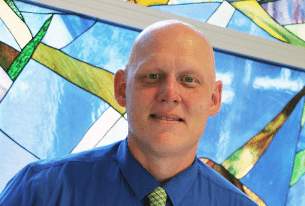Q: What is the Autism spectrum?
A: {Autism} can really be seen as a neurological difference or a way in which someone’s brain works differently than others. Even this neurological difference is different for everyone. For some this can come out as too rigid thinking or an inability to communicate the way that most people can. Sometimes we call this “social awkwardness” on the high functioning end. On the other end of the spectrum someone may only communicate in non-verbal way. Another piece could be having issues with the sensory world. Lights and sounds can make {people on the autism spectrum} uncomfortable. Or in some cases it can make {people on the autism spectrum} excited or aroused which can cause hyperactivity. This is why some kids on the autism spectrum like dim lights or quiet places, and may prefer for temperatures to be hot or cold. Again, the most popular manifestation of it is the social piece—that {people on the autism spectrum} do not socialize like others. The seven characteristics of neurological differences we talk about at Charterhouse School are:
- Awkward social interactions
- Aloneness: too much independence
- Unexpressed strengths
- Chaotic integration of external sensory world
- Difficulty learning from others
- Thinking loosely connected to meaningful contribution
- Rigid thinking
Q: Is autism something that is developed, or is it a genetically predisposed condition?
A: Autism is a developmental disorder, which means that people on the autism spectrum have brains that have developed in a different way compared to “neuro-typical” people. It falls into the same category as intellectual disabilities and communication disorders and ADHD. So there’s cognitive development that hasn’t happened—or that happened in a different way. So people on the autism spectrum are born with the condition.
Q: Who do I talk to if I suspect that my child might be on the autism spectrum?
A: I would talk to a child psychologist, a licensed clinical social worker, or a licensed professional counselor. Typically there are people with these credentials that specialize in autism and developmental challenges. There are also organizations in Richmond such as Commonwealth Autism, the Autism Society of Central Virginia, or Autism Speaks that are great resources. Pediatricians are obviously the authority on dealing with your child’s medical concerns, but child or developmental psychologists, LCSW’s, or LPC’s are the go-to for all issues related to Autism and developmental disorders.
Q: Will my child be able to attend school?
A: Yes—without a doubt. People on the autism spectrum can go to public school with or without supports—depending on the level of need. I’ve seen children on the autism spectrum go to school with very little supports. They might have a pullout program or some resource time. The rest of the time they are in the public school setting with everybody else. Other students may require specialized classroom or even specialized schools in order to realize their full potential.
Q: What is the most common fear among parents with children on the autism spectrum?
A: It’s anxiety about the future. Will {children on the autism spectrum} be able to find success in the “neuro-typical” world. will they ever be able to get a job?, can they get a college degree?, will they have friends?, will they meet a girl/boy, will they get married? Will they have what we consider a normal social life once they are adults and don’t have our supports? Will he/she get into a situation he/she doesn’t understand and be able to navigate it?
Q: How many children on the autism spectrum are served by UMFS?
A: Currently there are 118 students at Charterhouse School Richmond. Forty of those students are residential. Of those forty, nine of them are on the autism spectrum. In general, of all 118 in the school (day and residential), 33 students are on the autism spectrum. The staff at Charterhouse School Edinburg also serves students with autism that require greater support. Many of those students only communicate in non-verbal way.
Q: In regards to serving people on the autism spectrum, what is UMFS doing that is innovative?
A: Firstly, we are in the process of piloting a new model for working with these students in collaboration with our residential program – The Child & Family Healing Center. This model focuses more on the relational and developmental aspects of growth for these children rather than putting all of the emphasis on looking at behaviors. Secondly, Courage to Succeed is our college support program for kids on the autism spectrum. They apply to J. Sargeant Reynolds Community College and to the Courage to Succeed program simultaneously. Kids in the program take classes Monday, Wednesday, and Friday at J. Sargeant Reynolds with social coaches on campus to support them. These coaches help them keep up with assignments, homework, and social skills. Then on Tuesdays and Thursdays they are on this campus (UMFS) and they do community service, called “generosity projects.” We try to gear those around getting into the community and having to interact with people. For instance, they recently did a project for Meals on Wheels. The kids also have a regular group counseling session with one of the therapeutic coaches—much like a support group. They practice social skills, and study skills here on campus with the support of the staff. Then, during the summer they all do internships.
More information about UMFS programs and services related to Autism is available on the Charterhouse School website at http://www.charterhouseschool.org/autism-spectrum/.
